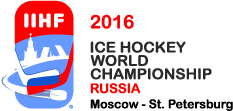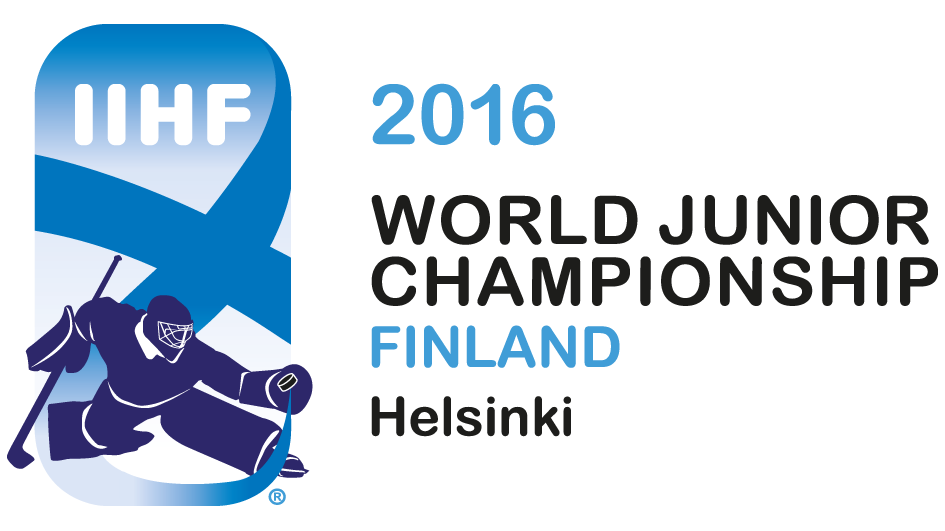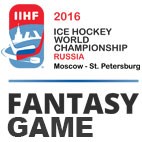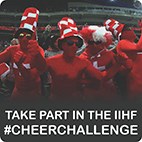It’s all or nothing now
It’s all or nothing now
Who’ll come out on top in quarter-finals?

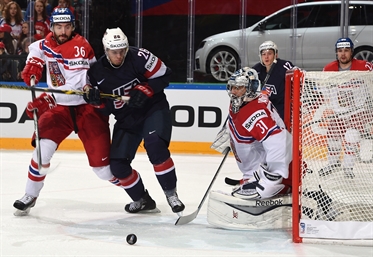 The Czech Republic-U.S. quarter-final is a rematch of the 2015 bronze medal game. Photo: Richard Wolowicz / HHOF-IIHF Images
The Czech Republic-U.S. quarter-final is a rematch of the 2015 bronze medal game. Photo: Richard Wolowicz / HHOF-IIHF Images
Out of all the quarter-finalists, the unbeaten Finns appear to have the surest path to victory. They’re up against Denmark, a nation they’ve defeated in six out of seven all-time World Championship meetings. (The lone loss was 4-1 in the 2010 tournament opener for both teams.)
Eighteen-year-old winger Patrik Laine leads Finland with 10 points, and all of them have come against nations outside the top eight in the IIHF World Ranking. It seems likely that the towering wunderkind and linemates Aleksander Barkov and Jussi Jokinen will feast again on Denmark. However, as the Finns showed in their 4-0 win over Canada, they have scoring throughout the lineup. And with just six goals allowed, they’re also the tournament’s best defensive team.
Yet they’re not allowing their dominance to breed disrespect for the Danes, who have gotten stellar performances from the likes of forwards Nicklas Jensen (5-2-7) and Nikolaj Ehlers (4-1-5) and goalie Sebastian Dahm (1.92 GAA and 94.5 save percentage). “I know they have good players,” said Finnish starting goalie Mikko Koskinen. “They are top-eight. They have to be a really good team, because there are no bad teams anymore left. It’s going to be a big battle for us.”
One way Finland could lose this game is by giving up too many chances to the deadly Danish power play, which leads the tournament at 34.6 percent. Captain Mikko Koivu emphasized the importance of discipline: “I think you have to play with your instincts, but we do talk about it. The further you go in a tournament, the more important it gets. For sure, we want to keep that and stay out of the box as much as we can.”
The Czech Republic-U.S. quarter-final is a rematch of the 2015 bronze medal game, which the Americans won 3-0 in what tournament MVP Jaromir Jagr announced was his international swan song. Despite not boasting as star-studded a roster as on home ice in Prague last year, the more experienced Czechs are probably the favorites here – at least according to Lukas Kaspar.
The 28-year-old KHL forward, who scored on a penalty shot against Switzerland, said: “I think the team we have here can beat anybody. I guess we will just have some meetings, look at the videos of the USA games, and get ready for them. I was confident from Day One, and I believe we can beat them.”
With the man advantage, the U.S. has the advantage. Its power play is clicking at 26.6 percent, compared to 18.2 for the Czechs. However, the Czechs have received better goaltending, going right back to the 3-0 opening win over host Russia. Pavel Francouz and Dominik Furch have combined for a 92.8 save percentage and 1.67 GAA, whereas Keith Kinkaid and Mike Condon have a 87.9 save percentage and 2.57 GAA despite their NHL pedigrees.
Nevertheless, if the U.S. prevailed here, it wouldn’t be as stunning of an upset as when Andy Roach scored on Tomas Vokoun to give the Americans a 3-2 shootout win against an all-star Czech squad in Prague 2004. The Czechs have just four NHLers, and are led offensively by Roman Cervenka (2-5-7) and Michal Birner (4-3-7). It’ll be a great test for American kids like Dylan Larkin (2-5-7) and Auston Matthews (3-3-6) to see how they deliver under pressure.
On paper, the Russia-Germany quarter-final should be lopsided in favor of the host nation. But anyone who knows their recent IIHF history knows that the Germans never make it easy on Russia. En route to the 2010 silver medal in Cologne, the Russians barely edged Germany twice (3-2 in round-robin play, 2-1 in the semi-final). Germany then beat Russia for the first time ever in 2011 (2-0). The Russians have come out on top by three goals in the last two group meetings (4-1 in 2013, 3-0 in 2014).
“The Germans always play well against us,” said Russian captain Pavel Datsyuk. “They’re an experienced, mobile team. It won't be an easy game.”
Setting history aside, it will be a huge challenge for coach Marco Sturm’s men to contain the tournament’s highest-scoring line with overall leader Vadim Shipachyov (3-10-13), Artemi Panarin (5-7-12), and Yevgeni Dadonov (4-5-9). Datsyuk (1-7-8) has provided the leadership you’d expect from the “Magic Man,” even at 37with his NHL career possibly in the rear view mirror. The Washington Capitals-driven trio of NHL goal-scoring champ Alexander Ovechkin, Yevgeni Kuznetsov, and Sergei Shirokov could bust out at any moment, too. It’s a bonanza of speed, skill, and scoring for Russian coach Oleg Znarok.
For Germany, playing without NHL forward Tobias Rieder, plus DEL stalwarts in forward Gerrit Fauser and defenceman Torsten Eckert, will also be difficult. They’ll have to clog up the neutral zone, be physical without taking penalties, and be opportunistic. “Germany has a disciplined team,” acknowledged Russian blueliner Alexei Yemelin. “They play really well in defence and in centre ice.”
Still, if New York Islanders goaltender Thomas Greiss can continue to limit opponents to two goals per game, as he’s done since coming in, the Germans have a chance of dealing Russia another quarter-final shocker. The mercurial Russians fell 8-3 to the U.S. in the 2013 quarter-final (their worst World Championship loss ever) and 3-1 to Finland in the 2014 Olympic quarter-final.
The hardest quarter-final to predict is Canada-Sweden. The Canadians had shone in all areas until getting blanked by Finland in their final group game – it was, in fact, Canada’s first defeat at the Worlds dating back to the 2014 quarter-final loss to Finland. But disturbing tendencies emerged, including poor discipline from the likes of captain Corey Perry and talented agitator Brad Marchand, and weak goals surrendered by starting goalie Cam Talbot. The defending champs looked frustrated when they encountered their stiffest opposition to date. Will Canada get back on track on Thursday?
There is mutual respect between Canada and Sweden. The Swedes have only failed to make it to the World Championship semi-finals four times since the IIHF instituted the playoff system back in 1992. They should be well-organized under coach Par Marts, who led his squad to gold in Stockholm in 2013, breaking the “home ice curse” that went back to 1986.
But with that said, the Canadians can control their own fate here. Gustav Nyquist is the biggest name on this year’s Tre Kronor, and goalie Jacob Markstrom has a long way to go before he can fill the skates of NHL superstar and 2006 Olympic gold medalist Henrik Lundqvist.
In Moscow, the Swedes eked out one-goal wins over Latvia, Norway, and Switzerland, and lost to the best teams in their group, the Czechs and Russians. It’s been a mediocre showing. Yet it was similar up to this stage in 2013, and a quarter-final win over Canada would (again) change everything.
“They’re a fun team to play against,” said Nyquist, Sweden’s scoring leader (7-1-1). “We’re looking forward to it. They're a strong team, obviously, but we're looking forward to the challenge.”
“Sweden’s always tough,” said Taylor Hall, the top Canadian goal-scorer (6-2-8) and a returnee from the golden 2015 team. “They play the right way. They play a lot like the Finns do. They’re pesky, they’re skilled. And we’re going to have to play well if we want to have a chance.”
It’s all or nothing now. Bring on the excitement on the road to gold.
Back to Overview

